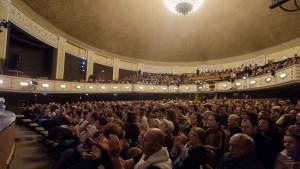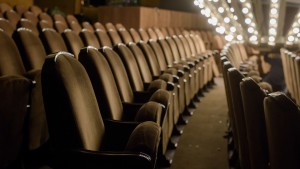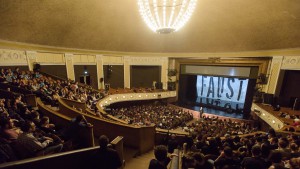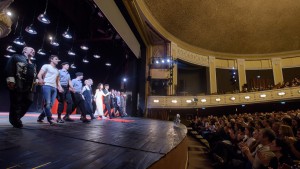“Our theatre, such as this festival wants to belong to the whole city”
In the most central position of the Hungarian Theatre of Cluj, next to the main entrance, hangs the portrait of Gábor Tompa, artistic director of the theatre for the past 26 years. He also founded and runs the ‘Interferences International Theatre Festival’, for the 5th edition of which (24th November-4th December) we – the Journalists of UTE´s Online-Magazine Conflict Zones.Reviews – visited the second largest city in Romania, the picturesque Cluj, 324 kilometres north of Bucharest.
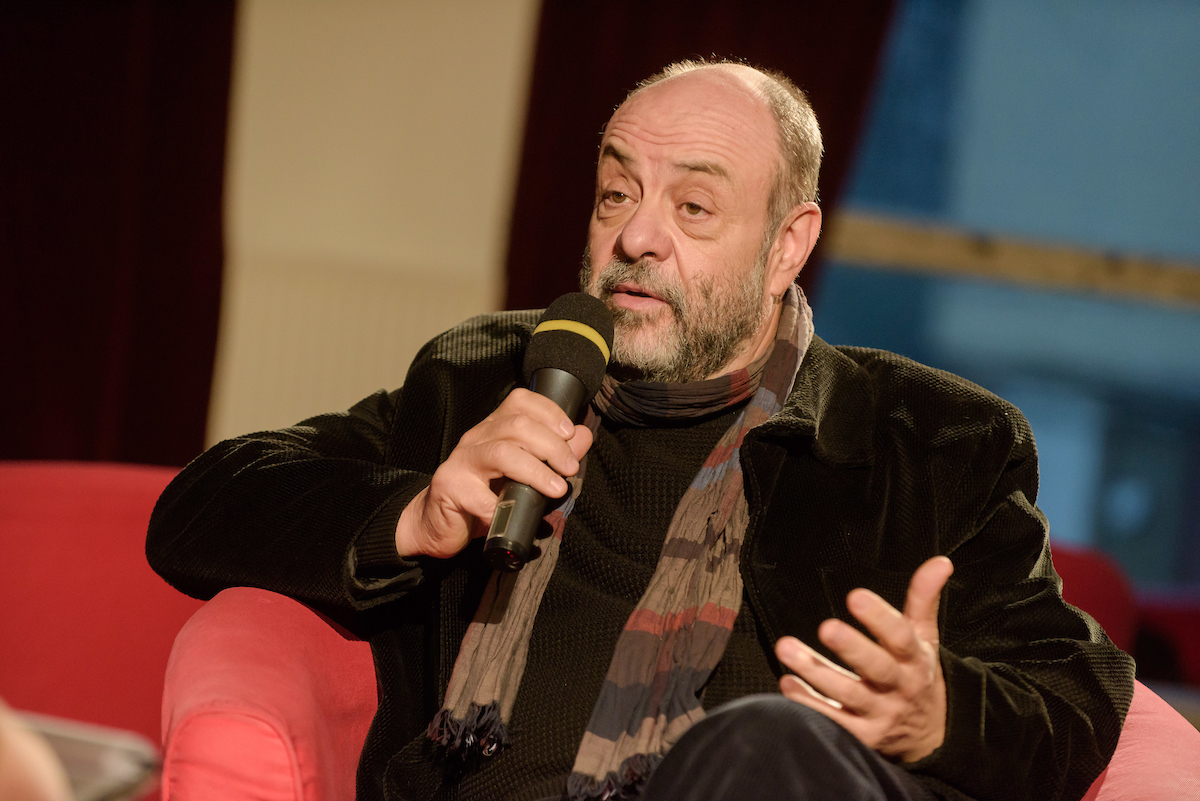
After receiving the first snow of the season, the city is frozen and decorated with numerous flags due to the Romanian National day (every 1st of December they celebrate the unification of Valahia, Transylvania and Moldavia in 1918). The atmosphere inside the Hungarian Theatre of Cluj – member of the «Union des Théâtres de l Europe» since 2008 – is definitely much warmer. Dozens of volunteers joyously take care of every single detail and the theatre lovers of the city enjoy discovering performances from all over the world.
Such as the Korean performance, the curtain of which has just fallen, receiving the warmest rhythmic applause from the audience. It naturally takes the artistic director of the theatre and the festival, Gabor Tompa, longer than usual to cover the distance from the stalls to the main entrance, as he is constantly engaged in greeting friends and in brief conversations.
What if governments change at the speed of light in this idiosyncratic city of the Southeast Europe? Gabor Tompa remains in the same position. “We often happen to have three different Ministers in a year. This is one of the obstacles we have to overcome in our work, which I have always considered as a long-term project” he explains as we cross the stage, where some technicians are occupied with removing the set of the performance which has just finished, and preparing for tomorrow morning’s rehearsal. A busy beehive.
A staircase at the back of the stage leads up to his office. The walls are decorated with mementos and awards of a journey that started in 1990 and still goes on. “We had to modify contracts, build a team, a 36-actor ensemble and a repertory. But we also had to be international, build a ‘studio’ and a team of young actors. I always feel all this is too fragile to be abandoned. Of course, the administrative issues are far too many, so I am deprived of a significant part of my energy. I always try to find the pleasure in what I am doing” he says and carries on.
“Where I do locate the source of pleasure, I would say that it is basically found in the team of young people who work with me and who are quite independent, since they can make their own decisions without having to get my approval all the time.
“This helps me a lot since I have to spend a lot of time in Los Angeles where I teach acting, as well as in other countries where I direct. Then, pleasure lies within the opportunity I am given to invite directors I admire to come and work with us. Not few artistic directors choose to invite weaker artists than themselves. On the contrary, not only do I want to invite people whose work I admire, but who I also believe to happen to know something about the theatre which I ignore.
“I see that as a supplementary procedure” he explains. As for whether he would miss the office in which he has spent almost a lifetime: the answer is astounding! “I most certainly believe the reason I am still here is because I don’t actually care about the position as such”.
We are one step away from the closing of this year’s festival and he confesses having gained this: “The pleasure of having almost doubled our audience and of beginning to succeed in what we had really wanted in the first place: uniting the people of Cluj.”
And he explains: “There is this pretty common phenomenon here that has to do with the division of communities in everyday life: Romanians, Hungarians, Germans, Jews, but also people of different religions or social backgrounds.
“This theatre, founded 224 years ago, in 1792, is the oldest Hungarian theatre in the world. But we really want it to belong to the whole city and to people who gather here in order to encounter one another. This is why, not only now during the festival, but all year-round, we translate our performances into at least two more languages: Romanian and English, as our company performs in Hungarian. This helps win the trust of the Romanian community, so the proportions are now 65%-35% or 70%-30%. Moreover, there are seventy thousand students in Cluj who are the best audience.”
So if the goal set is so big, with what criteria does one choose the performances that are to be included in a two-year international theatre festival?
«First of all, we begin by choosing the subject, which this year was “The Odysseys of a Foreigner”. We have already found the subject of the next festival, two years from now. It is going to be “War Memories” since it will take place 100 years after the end of World War I. Among others we are thinking of inviting Ivo Van Hove, the new artistic director of the Comédie-Française.
“The performances I select approach the subject from different aspects, so as to complement one another. Of course, it is impossible to have only masterpieces. And actually, this is not the objective. Yes, there are performances which happen to be enthusiastically received by the audience and others which shape it. My experience has proved to me that the audience can be educated. The most important thing is to move on and take risks.
“We try to invite all kinds of performances: from well established companies to small independent ones. For instance, this year we invited a performance called ‘It’s Not the Time of My Life’, which was the first adaptation of a film that won this year’s award in Karlovy Vary. An utterly independent performance with absolutely no budget.”
He insists that he does not believe in the separation between independent and repertory theatre. “This is a plain nonsense for obsessionals and critics. In this case, we are rather concerned with ourselves than with the theatre as such. No, we need to let ourselves out of the picture.”
What about his personal point of view as far as this year’s subject, the Foreigner, is concerned? “It is not restricted to the immigration and refugee issues which are pretty hot. There is a more philosophical approach to it. What does it mean to be a foreigner? What does it mean to belong? What is the European identity? Which us, the East-Europeans almost have or believe to have? I think that solidarity nowadays is not powerful enough. Although the world is becoming smaller and smaller. For example, something happens here as we speak and people all over the planet find out about it in a few minutes. However, we still believe we are not affected by it. This is wrong. Everything that goes on involves us. We are to be found in every story. On the other hand, of course, we live in a period of a completely hypocritical political correctness and you can see the result. We witnessed it recently in the US elections. We ought to analyse what brings this about” he says.
Our conversation carries on about the qualities of the renowned Romanian directing school, which as he explains to us “puts forward the concepts, proposing each time a strong choice of play and a strong directing approach, from which are derived all the supplementary elements” and ends up to the Greek theatre as a plentiful source.
“What is very important is that the ancient audience did not use to go to the theatre to listen to stories. They were all acquainted with the story of Antigone or Medea. They did so in order to taste the actual experience. Nonetheless, it’s not just the drama itself that teaches us a lot” as he says. “The Dionysia was the first festival ever. A celebration in which the whole city took part. And this is something we always need to keep in mind.
“Max Reinhardt, who re-invented the festivals in Europe, wanted the Salzburg Festival to be a celebration of the whole city, like in ancient times. When everyone would take part.”
Published on 15 December 2016 (Article originally written in Greek)
